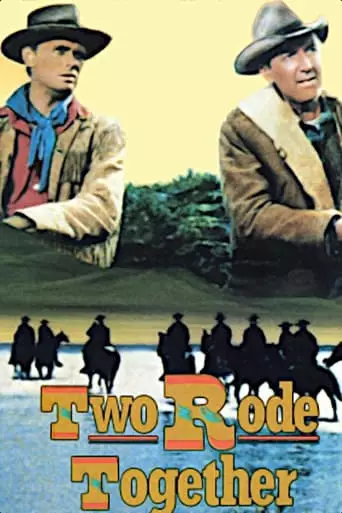
Two tough westerners bring home a group of settlers who have spent years as Comanche hostages.
John Ford’s Two Rode Together (1961) is a Western that examines themes of morality, cultural assimilation, and personal redemption. The film centers around two men, Guthrie McCabe (James Stewart), a cynical and opportunistic marshal, and Lt. Jim Gary (Richard Widmark), an idealistic cavalry officer. Their mission is to track down white captives who were taken by Native Americans during raids and bring them back to their families.
The film begins with McCabe, who has settled into a life of comfort in a small Texas town, where he is financially supported by a share of the profits from the local businesses. His life is disrupted when he is enlisted by Lt. Gary to help recover the captives. Together, they set out for a Comanche camp to negotiate the return of these people, many of whom have been raised as Comanches and are reluctant to leave. This journey leads to moral conflicts and personal reckonings as they confront not just the physical challenges of their mission but also the societal prejudices of the people they are trying to help.
Themes and Analysis: At the heart of Two Rode Together is the complex relationship between white settlers and Native Americans. The film critiques the hypocrisy and moral ambiguity of both sides. While the settlers are depicted as being willing to engage in financial transactions with the Comanches, they are also shown to harbor deep-seated racism and a naive understanding of the people they seek to “rescue.” The film contrasts this with the Comanches, who, despite their often brutal treatment of captives, live within a complex moral framework of their own.
The film’s narrative reflects the unsettled nature of the post-Civil War American frontier, exploring how people from different cultural backgrounds struggle to reconcile their differences. The interaction between McCabe and Lt. Gary, as well as their differing approaches to the mission, highlights the theme of moral conflict. Ford’s direction, though often considered minor in his oeuvre, offers a strong commentary on these themes through nuanced character development and subtle social critique.
Impact and Legacy: Two Rode Together represents a departure from John Ford’s typical Westerns, offering a more reflective, less action-driven narrative. Though it shares thematic elements with The Searchers (such as the return of captives and the tension between white society and Native American life), it doesn’t have the same depth of exploration into racism or redemption. Ford’s subtlety in portraying the characters’ moral dilemmas makes this film unique, though it’s less often discussed than some of his more famous works.
However, the film’s exploration of difficult ethical questions, such as the value of cultural assimilation and the impact of historical trauma, has earned it critical interest over time.
After watching Two Rode Together, you might feel a sense of unease due to its complex exploration of racism, cultural identity, and the moral compromises inherent in frontier life. The film does not provide easy answers, and the somewhat melancholic ending leaves viewers contemplating the unresolved conflicts between the characters and the larger societal issues they face. This is a film that lingers with you, forcing reflection on the difficult choices made by both the protagonists and the people they aim to help.
The lack of clear resolution may leave some viewers dissatisfied, while others might appreciate its depth and understated critique of the American West.
